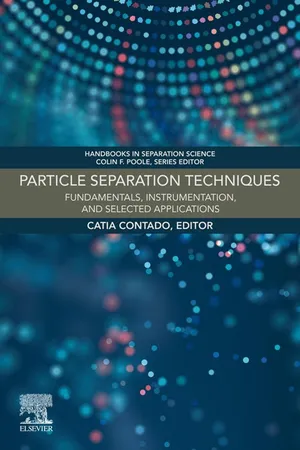
- 768 pages
- English
- ePUB (mobile friendly)
- Available on iOS & Android
eBook - ePub
About this book
Particle Separation Techniques: Fundamentals, Instrumentation, and Selected Applications presents the latest research in the field of particle separation methods. This edited book authored by subject specialists is logically organized in sections, grouping the separation techniques according to their preparative or analytical purposes and the particle type. Along with the traditional and classical separation methods suitable for micronic particles, an update survey of techniques appropriate for nanoparticle characterization is presented. This book fills the gap in the literature of particle suspension analysis of a synthetic but comprehensive manual, helping the reader to identify and apply selected techniques.It provides an overview of the techniques available to a reader who is not an expert on particle separation yet about to enter the field, design an experiment, or buy an instrument for his/her new lab.
- Presents a resource that is ideal for anyone preparing samples across a variety of fields, including pharmaceuticals, food science, pollution analysis and control, agricultural products, and more
- Includes real case examples discussed by leading experts in the field
- Provides chapters that contain a unique, common table that summarizes points-of-strength and the weaknesses of each technique
Frequently asked questions
Yes, you can cancel anytime from the Subscription tab in your account settings on the Perlego website. Your subscription will stay active until the end of your current billing period. Learn how to cancel your subscription.
No, books cannot be downloaded as external files, such as PDFs, for use outside of Perlego. However, you can download books within the Perlego app for offline reading on mobile or tablet. Learn more here.
Perlego offers two plans: Essential and Complete
- Essential is ideal for learners and professionals who enjoy exploring a wide range of subjects. Access the Essential Library with 800,000+ trusted titles and best-sellers across business, personal growth, and the humanities. Includes unlimited reading time and Standard Read Aloud voice.
- Complete: Perfect for advanced learners and researchers needing full, unrestricted access. Unlock 1.4M+ books across hundreds of subjects, including academic and specialized titles. The Complete Plan also includes advanced features like Premium Read Aloud and Research Assistant.
We are an online textbook subscription service, where you can get access to an entire online library for less than the price of a single book per month. With over 1 million books across 1000+ topics, we’ve got you covered! Learn more here.
Look out for the read-aloud symbol on your next book to see if you can listen to it. The read-aloud tool reads text aloud for you, highlighting the text as it is being read. You can pause it, speed it up and slow it down. Learn more here.
Yes! You can use the Perlego app on both iOS or Android devices to read anytime, anywhere — even offline. Perfect for commutes or when you’re on the go.
Please note we cannot support devices running on iOS 13 and Android 7 or earlier. Learn more about using the app.
Please note we cannot support devices running on iOS 13 and Android 7 or earlier. Learn more about using the app.
Yes, you can access Particle Separation Techniques by in PDF and/or ePUB format, as well as other popular books in Scienze fisiche & Chimica analitica. We have over one million books available in our catalogue for you to explore.
Information
Table of contents
- Title of Book
- Cover image
- Title page
- Table of Contents
- Copyright
- Dedication
- Contributors
- Part I: Introduction
- Part II: Preparative separations
- Part III: Analytical separations
- Part IV: Present challenges
- Index